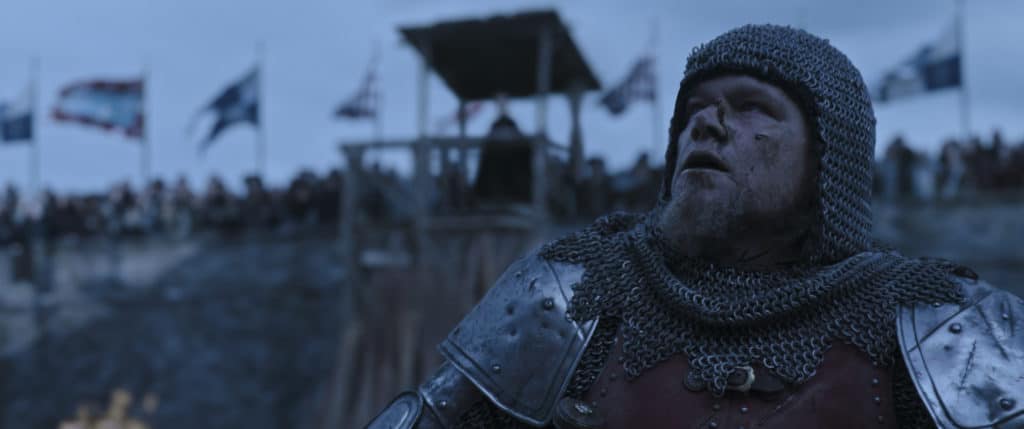Moviegoer: The Last Duel

Two knights battle over truth while a woman suffers in this uneven drama
By Diana Beechener
The rivalry between Jean de Carrouges (Matt Damon: Stillwater) and Jacques Le Gris (Adam Driver: Annette) goes back decades. Once friends, the duo have a long history of fighting side-by-side during the Hundred Years War, using swords and blood to bring honor to 14th century France. Fractures appeared between the two when Jacques won the favor of Count Pierre d’Alençon (Ben Affleck: The Way Back). Suddenly Jacques is gifted with land and status that Jean feels is his by right.
Things come to a head when Jean’s wife, Marguerite (Jodie Comer: Free Guy) accuses Jacques of sexual assault. Jean is disgraced, Jacques claims it’s an affront to his reputation, and Marguerite simply wants justice. Jean decides there’s only one way to deal with the situation: challenge Jacques to a duel to the death.
According to French law, the winner of the duel is telling the truth and the loser has been judged guilty. This means that Marguerite’s life and reputation are tied to Jean’s: If he wins, she’ll be viewed as a wronged woman who received justice. If he loses, she’ll be burned at the stake for besmirching a man’s reputation.
Can Jean defeat his old friend and reclaim his honor? And is there any such thing as justice for a woman viewed as her husband’s property?
The Last Duel is a film that desperately wants to make a few points about the way women are treated. The movie goes to great pains to outline how women were sidelined, dismissed, and degraded. It’s therefore quite a shame that the movie shoves Marguerite and her story aside for two-thirds of the film.
Director Ridley Scott (All the Money in the World) has always been talented with a battle, and that hasn’t changed in The Last Duel. There are some truly breathtaking battle sequences, and the brutality of the titular duel makes for riveting storytelling. The cinematography and feel of the film all have Scott’s signature sense of scope and style.
But the film falters when dealing with the sexual assault. It attempts a truly baffling Rashomon-style to explain how the events are viewed by each party. But about an hour in, Scott declares one of the perspectives to be “the truth”, which essentially means viewers have wasted their time for half the film. By eliminating all ambiguity and portraying Comer’s Marguerite as a sainted victim of both men and history, Scott ends up reducing the only female character to patriarchal stereotype.
It’s a shame the film doesn’t trust Comer with some ambiguity and shading because she delivers an excellent performance. Each actor must play, in essence, three roles—one for each perspective that’s used in the film. Comer does the best with this assignment. Her Marguerite is the picture of devotion in Jean’s recollections, a sly temptress in Jacques’ recollections, and a smart but stifled woman beaten down by her sex and station in her own recollections. It’s truly gripping work, which is why it’s a shame Scott didn’t feature it more.
Driver and Damon are less successful in their performances. Damon especially seems uncomfortable with his roles, lumbering through scenes and butchering French names. Oddly, the most successful male performance in the film may be Ben Affleck’s, whose broad lecherous Pierre would be at home in a remake of Caligula. Is it a good performance? Perhaps not, but at least it’s entertaining.
Affleck and Damon also wrote the script. They took pains to note that they asked Nicole Holofcener (The Land of Steady Habits) to write the female third of the film. This is probably why the film feels so very disjointed, with Marguerite having her feminist awakening and only becoming human in the last bit of the film. It was a nice gesture, but ultimately a hollow one.
While The Last Duel has excellent intentions, and some pretty excellent battle scenes, it must be said that it fails as a Ye Olden Me Too movie. This story, which hopes to poke at and examine male vanity, ultimately ends with two men duking it out while a woman watches in the background. Scott and Co. no doubt wanted that to be a metaphor for the film, but it ended up being an allegory for how Hollywood still tells “women’s stories”.
Fair Drama * R * 152 mins.
